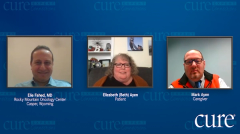
Multiple Myeloma: A Caregiver’s Perspective and Advice
Mark provides insight into multiple myeloma from the perspective of the caregiver and offers advice to others who might be in the same position.
Episodes in this series

Elie Fahed, MD: Let me thank Mark here for all the help he’s offering you. I feel that caregivers are always underappreciated. Your disease is affecting him as much as it’s affecting you. Mark, is there anything you want to share for caregivers listening to us today? What has your experience been? Any advice or recommendations on how to deal with similar situations or what they can learn from your experience?
Mark Ayen: The thing that I’ve explained to people over the years is that myeloma, in a lot of ways, is almost an invisible disease because there are not a lot of outward symptoms. You sometimes can’t even tell that Beth is sick. What I’ve learned and what I tell people is, “You just have to be aware that they are hurting, not feeling well, or suffering in some way. A lot of times, acknowledging that they are struggling with something will help immensely.”
With Beth, it’s sometimes funny because she wants or needs something, but she doesn’t know what it is, so I’ll take my best stab at it. I will usually bring her the wrong thing. Then she would know what she wants, and I can then do that for her. I sometimes get lucky and bring her the right thing, and then everyone’s happy. That’s the biggest thing: the acknowledgment that she’s going through pain, that she’s not feeling well, that she’s tired, or that she needs to have a day in bed, and give her the permission to have that day if she needs it.
Elie Fahed, MD: Is there anything we as medical providers or we as a society can do better for you, Mark, or other caregivers? Do you feel like there is anything we can do to make your lives easier? Any recommendations or advice?
Mark Ayen: I would like to say painkillers, but no. One thing I’ve always appreciated is that all the doctors we’ve had over the years have always been really up front by saying, “These are the things to expect.” There’s never been anything hidden, and there’s never been anything secret that the doctors weren’t telling us. That’s been the most helpful thing: I always knew what the possibilities were. I knew what could possibly happen, and I knew that, if she suddenly grew a blue balloon out of her nose, then I knew to call immediately. I always knew what the dangers were, and what the concerns were, and that gives me some peace of mind, knowing this stuff is normal. They always said, “You’re going to feel this way, and that’s normal, so we’re going to help you with that.”
As far as what else the medical community can do, I can’t think of anything. It’s a decision, a choice. I have to figure out what it is that I need to care for my patient, ask the questions I need to ask, and be available to do what I need to do.
Elie Fahed, MD: Thank you for being present and for all you do to support Beth. I know she’s the patient, but I know it’s harder for her to do it all without you.
This transcript was edited for clarity.
